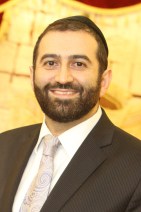Parasha Thoughts
By Rabbi Shemuel Akhamzadeh
לֹ×־תִרְ×ֶה֩ ×ֶת־חֲמ֨וֹר ×ָחִ֜יךָ ×֤וֹ ש×וֹרוֹ֙ × Ö¹×¤Ö°×œÖ´Ö£×™× ×‘Ö¼Ö·×“Ö¼Ö¶Ö”×¨Ö¶×šÖ° וְהִתְעַלַּמְתָּ֖ ×žÖµ×”Ö¶Ö‘× ×”Ö¸×§ÖµÖ¥× ×ªÖ¼Ö¸×§Ö´Ö–×™× ×¢Ö´×žÖ¼Ö½×•Ö¹×ƒ
If you see your fellow’s ass or ox fallen on the road, do not ignore it; you must help him raise it.
.
The Talmud states that we learn from the words ×”Ö¸×§ÖµÖ¥× ×ªÖ¼Ö¸×§Ö´Ö–×™× ×¢Ö´×žÖ¼Ö½×• ( you must help him), that one is not required to help his friend’s animal unload its burden unless the owner is helping as well.
The Torah’s commandments are a set of rules that reflect Hashem’s will and how he wants the world to be conducted, and surely Hashem acts in the same manner. The Chofetz Chaim relates that when it comes to our own needs, Hashem applies the same rule of ×”Ö¸×§ÖµÖ¥× ×ªÖ¼Ö¸×§Ö´Ö–×™× ×¢Ö´×žÖ¼Ö½×•. If we are willing to roll up our sleeves and take action for what we are asking, then Hashem personally gets involved and helps us reach our goal.For instance, we ask Hashem in Shaharit everyday that he should open our eyes to understand his Torah. However, if we are not willing to pull up a chair and open a Sefer after Tefillah and learn a few Mishnayot or a Daf of Gemara then this Tefillah is surely in vain and not accepted by Hashem.
It’s comparable to a person who asks his friend for a loan. His friend accepts his request and tells him that he should come to his home to pick up the money, but he never ends up going to pick up the money.
Elul is a time when we beseech Hashem in Selichot and Tefillot to overlook our flaws and allow us to come closer to him so that we can have a better standing on Rosh Hashana and Yom Kippur. Now let us hearken to the words of the Chofetz Chaim; let’s take initiative so that Hashem will help us become closer to him. Perhaps we can start with scheduling a short class on Torah or Tefillah, or maybe set time to do Chessed on a weekly basis.

